-

新人教版高中英语选修2Unit 4 Journey Across a Vast Land教学设计
当孩子们由父母陪同时,他们才被允许进入这个运动场。3.过去分词(短语)作状语时的几种特殊情况(1)过去分词(短语)在句中作时间、条件、原因、让步状语时,相当于对应的时间、条件、原因及让步状语从句。Seen from the top of the mountain (=When it is seen from the top of the mountain), the whole town looks more beautiful.从山顶上看,整个城市看起来更美了。Given ten more minutes (=If we are given ten more minutes), we will finish the work perfectly.如果多给十分钟,我们会完美地完成这项工作。Greatly touched by his words (=Because she was greatly touched by his words), she was full of tears.由于被他的话深深地感动,她满眼泪花。Warned of the storm (=Though they were warned of the storm), the farmers were still working on the farm.尽管被警告了风暴的到来,但农民们仍在农场干活。(2)过去分词(短语)在句中作伴随、方式等状语时,可改为句子的并列谓语或改为并列分句。The teacher came into the room, followed by two students (=and was followed by two students).后面跟着两个学生,老师走进了房间。He spent the whole afternoon, accompanied by his mom(=and was accompanied by his mom).他由母亲陪着度过了一整个下午。

新人教版高中英语选修2Unit 1 Science and Scientists-Learning about Language教学设计
Step 7: complete the discourse according to the grammar rules.Cholera used to be one of the most 1.__________ (fear) diseases in the world. In the early 19th century, _2_________ an outbreak of cholera hit Europe, millions of people died. But neither its cause, 3__________ its cure was understood. A British doctor, John Snow, wanted to solve the problem and he knew that cholera would not be controlled _4_________ its cause was found. In general, there were two contradictory theories 5 __________ explained how cholera spread. The first suggested that bad air caused the disease. The second was that cholera was caused by an _6_________(infect) from germs in food or water. John Snow thought that the second theory was correct but he needed proof. So when another outbreak of cholera hit London in 1854, he began to investigate. Later, with all the evidence he _7_________ (gather), John Snow was able to announce that the pump water carried cholera germs. Therefore, he had the handle of the pump _8_________ (remove) so that it couldn't be used. Through his intervention,the disease was stopped in its tracks. What is more, John Snow found that some companies sold water from the River Thames that __9__________________ (pollute) by raw waste. The people who drank this water were much more likely _10_________ (get) cholera than those who drank pure or boiled water. Through John Snow's efforts, the _11_________ (threaten) of cholera around the world saw a substantial increase. Keys: 1.feared 2.when 3. nor 4.unless 5.that/which 6.infection 7.had gathered 8.removed 9.was polluted 10.to get 11. threat

新人教版高中英语选修2Unit 1 Science and Scientists-Reading and thinking教学设计
Step 5: After learning the text, discuss with your peers about the following questions:1.John Snow believed Idea 2 was right. How did he finally prove it?2. Do you think John Snow would have solved this problem without the map?3. Cholera is a 19th century disease. What disease do you think is similar to cholera today?SARS and Covid-19 because they are both deadly and fatally infectious, have an unknown cause and need serious public health care to solve them urgently.keys:1. John Snow finally proved his idea because he found an outbreak that was clearly related to cholera, collected information and was able to tie cases outside the area to the polluted water.2. No. The map helped John Snow organize his ideas. He was able to identify those households that had had many deaths and check their water-drinking habits. He identified those houses that had had no deaths and surveyed their drinking habits. The evidence clearly pointed to the polluted water being the cause.3. SARS and Covid-19 because they are both deadly and fatally infectious, have an unknown cause and need serious public health care to solve them urgently.Step 6: Consolidate what you have learned by filling in the blanks:John Snow was a well-known _1___ in London in the _2__ century. He wanted to find the _3_____ of cholera in order to help people ___4_____ it. In 1854 when a cholera __5__ London, he began to gather information. He ___6__ on a map ___7___ all the dead people had lived and he found that many people who had ___8____ (drink) the dirty water from the __9____ died. So he decided that the polluted water ___10____ cholera. He suggested that the ___11__ of all water supplies should be _12______ and new methods of dealing with ____13___ water be found. Finally, “King Cholera” was __14_____.Keys: 1. doctor 2. 19th 3.cause 4.infected with 5.hit 6.marked 7.where 8.drunk 9.pump 10.carried 11.source 12.examined 13.polluted 14.defeatedHomework: Retell the text after class and preview its language points

新人教版高中英语选修2Unit 1 Science and Scientists-Using langauge教学设计
This happens because the dish soap molecules have a strong negative charge, and the milk molecules have a strong positive charge. Like magnets, these molecules are attracted to each other, and so they appear to move around on the plate, taking the food coloring with them, making it look like the colors are quickly moving to escape from the soap.Listening text:? Judy: Oh, I'm so sorry that you were ill and couldn't come with us on our field trip. How are you feeling now? Better?? Bill: Much better, thanks. But how was it?? Judy: Wonderful! I especially liked an area of the museum called Light Games.it was really cool. They had a hall of mirrors where I could see myself reflected thousands of times!? Bill: A hall of mirrors can be a lot of fun. What else did they have?? Judy: Well, they had an experiment where we looked at a blue screen for a while, and then suddenly we could see tiny bright lights moving around on it. You'll never guess what those bright lights were!? Bill: Come on, tell me!? Judy: They were our own blood cells. For some reason, our eyes play tricks on us when we look at a blue screen, and we can see our own blood cells moving around like little lights! But there was another thing I liked better. I stood in front of a white light, and it cast different shadows of me in every color of the rainbow!? Bill: Oh, I wish I had been there. Tell me more!? Judy: Well, they had another area for sound. They had a giant piano keyboard that you could use your feet to play. But then, instead of playing the sounds of a piano, it played the voices of classical singers! Then they had a giant dish, and when you spoke into it, it reflected the sound back and made it louder. You could use it to speak in a whisper to someone 17 meters away.? Bill: It all sounds so cool. I wish I could have gone with you? Judy: I know, but we can go together this weekend. I'd love to go there again!? Bill: That sounds like a great idea!

新人教版高中英语选修2Unit 2 Bridging Cultures-Discovering useful structures教学设计
The grammar of this unit is designed to review noun clauses. Sentences that use nouns in a sentence are called noun clauses. Nominal clauses can act as subject, object, predicate, appositive and other components in compound sentences. According to the above-mentioned different grammatical functions, nominal clauses are divided into subject clause, object clause, predicate clause and appositive clause. In this unit, we will review the three kinds of nominal clauses. Appositive clauses are not required to be mastered in the optional compulsory stage, so they are not involved.1. Guide the students to judge the compound sentences and determine the composition of the clauses in the sentence.2. Instruct students to try to learn grammar by generalizing grammar rules, controlling written practice, and semi-open oral output.3. Inspire the students to systematize the function and usage of noun clause1.Instruct students to try to learn grammar by generalizing grammar rules, controlling written practice, and semi-open oral output.2.Inspire the students to systematize the function and usage of noun clauseStep1: The teacher ask studetns to find out more nominal clauses from the reading passage and udnerline the nominal clauses.

新人教版高中英语选修2Unit 3 Food and Culture-Discovering useful structures教学设计
The newspaper reported more than 100 people had been killed in the thunderstorm.报纸报道说有一百多人在暴风雨中丧生。(2)before、when、by the time、until、after、once等引导的时间状语从句的谓语是一般过去时,以及by、before后面接过去的时间时,主句动作发生在从句的动作或过去的时间之前且表示被动时,要用过去完成时的被动语态。By the time my brother was 10, he had been sent to Italy.我弟弟10岁前就已经被送到意大利了。Tons of rice had been produced by the end of last month. 到上月底已生产了好几吨大米。(3) It was the first/second/last ... time that ...句中that引导的定语从句中,主语与谓语构成被动关系时,要用过去完成时的被动语态。It was the first time that I had seen the night fact to face in one and a half years. 这是我一年半以来第一次亲眼目睹夜晚的景色。(4)在虚拟语气中,条件句表示与过去事实相反,且主语与谓语构成被动关系时,要用过去完成时的被动语态。If I had been instructed by him earlier, I would have finished the task.如果我早一点得到他的指示,我早就完成这项任务了。If I had hurried, I wouldn't have missed the train.如果我快点的话,我就不会误了火车。If you had been at the party, you would have met him. 如果你去了晚会,你就会见到他的。

新人教版高中英语选修2Unit 3 Food and Culture-Reading and thinking教学设计
The discourse explores the link between food and culture from a foreign’s perspective and it records some authentic Chinese food and illustrates the cultural meaning, gerography features and historic tradition that the food reflects. It is aimed to lead students to understand and think about the connection between food and culture. While teaching, the teacher should instruct students to find out the writing order and the writer’s experieces and feelings towards Chinese food and culture.1.Guide the students to read the text, sort out the information and dig out the topic.2.Understand the cultural connotation, regional characteristics and historical tradition of Chinese cuisine3.Understand and explore the relationship between food and people's personality4.Guide the students to use the cohesive words in the text5.Lead students to accurately grasp the real meaning of the information and improve the overall understanding ability by understanding the implied meaning behind the text.1. Enable the Ss to understand the structure and the writing style of the passage well.2. Lead the Ss to understand and think further about the connection between food and geography and local character traits.Step1: Prediction before reading. Before you read, look at the title, and the picture. What do you think this article is about?keys:It is about various culture and cuisine about a place or some countries.

新人教版高中英语选修2Unit 5 First Aid-Discovering useful structures教学设计
You have no excuse for not going.你没有理由不去。He was punished for not having finished his homework.他因未完成作业而受到惩罚。2.动词ing形式复合结构由物主代词或人称代词宾格、名词所有格或普通格加动词ing,即“sb./sb.'s+doing”构成。动词ing形式的复合结构实际上是给动词ing形式加了一个逻辑主语。动词ing形式的复合结构有四种形式:①形容词性物主代词+动词ing②名词所有格+动词ing③代词宾格+动词ing④名词+动词ingHer coming to help encouraged all of us.她来帮忙鼓舞了我们所有人。The baby was made awake by the door suddenly shutting.这个婴儿被突然的关门声吵醒了。Can you imagine him/Jack cooking at home?你能想象他/杰克在家做饭的样子吗?无生命名词无论是作主语还是作宾语都不能用第②种形式。Tom's winning first prize last year impressed me a lot.汤姆去年得了一等奖使我印象深刻。Do you mind my/me/Jack's/Jack leaving now?你介意我/杰克现在离开吗?Excuse me for my not coming on time.很抱歉我没能按时来。His father's being ill made him worried.他父亲病了,他很担心。We are looking forward to the singer's/the singer to give us a concert.我们盼望着这位歌手来给我们举办一场演唱会。
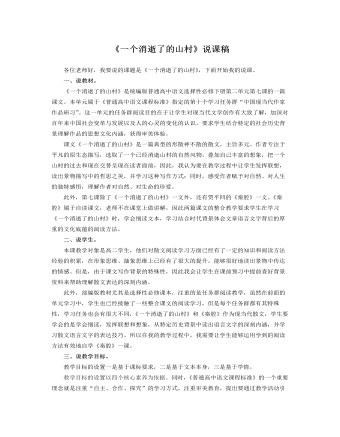
《一个消逝了的山村》说课稿 2021—2022学年统编版高中语文选择性必修下册
这几段内容传达出的是“要敬畏生命,尊重生命;更要敬畏大自然,尊重大自然,爱护大自然”的主旨内涵,因此让学生通过自由朗读的方式,再次体会冯至对这个消逝了的山村的细致的美好的描绘,感悟冯至传达出的对生命,对自然的理解和思考。5.最后一个自然段的解读依然是交给学生,先齐读课文,再让学生自主分享自己的体会或疑惑。但在这一环节我也设计了两个我认为必须解答的两个问题,一是怎么理解“在风雨如晦的时刻”;二是“意味不尽的关联”是指什么。我认为这两个问题一个涉及到写作背景,一个涉及到对全文主旨的一个整体把握,能够进一步帮助学生理解散文的深刻内涵和主旨,让学生有意识的在阅读散文过程中通过背景知识进行理解。既尊重学生的个性化解读,又能够让学生有意义学习,完成预设的教学目标。如果学生没有提到这两处,那我就需要做出补充。
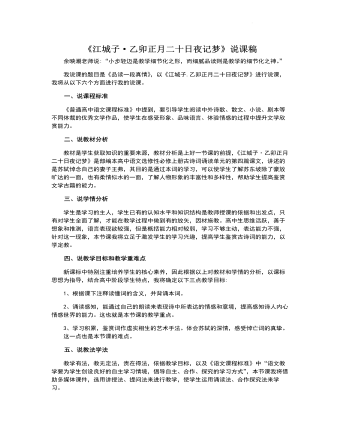
《江城子·乙卯正月二十日夜记梦》说课稿 2022-2023学年统编版高中语文选择性必修上册
一、温故导入好的导入未成曲调先有情,可以取得事半功信的教学效果。对于本节课我以温故知新的方式导入,以苏轼的《赤壁赋》和《念奴娇》引导学生感受苏轼的豪放和阔达,从学生熟悉领域出发,引导学生探究他内心深处的“柔情似水”,感受他的“十年生死”之梦。二、诵读感知(亮点一)《语文课程标准》中建议“教师要充分关注学生阅读需求的多样性,阅读心理的独特性”。所以在本环节我将综合运用听、读、问、答四种方式教学。首先通过多媒体听读,激发学生学习兴趣,直观感受苏轼的痛彻心扉和伤心欲绝。其次指定学生诵读,并在诵读之后,由学生点评,加深学生对于断句、轻重、快慢的理解,进一步感受本词的凄苦哀怨。最后配乐读,利用凄清的音乐引导学生通过自己的诵读来表现诗中所蕴含的真挚之感。设计意图:通过多种阅读方法,反复阅读本词,引导学生由浅入深的理解本词的思想内容和艺术风格,初步感受作者对妻子的挚爱之情和他的痛彻心扉,加深学生对文章的理解。
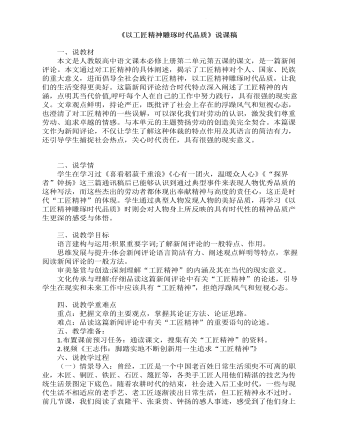
《以工匠精神雕琢时代品质》说课稿 2022-2023学年统编版高中语文必修上册
答案:铜车马的辉煌,来自原料的精挑细选、工艺的精巧极致和工匠的精心雕琢。可以说,是精益求精的工匠精神锻造出了“青铜之冠”的铜车马。2.“工匠精神”如此重要,那么,你认为“工匠精神”有着怎样的现实意义?观点一:工匠精神在企业层面,可以认为是企业精神。具体而言,表现在以下几个方面。第一,创新是企业不断发展的精神内核。第二,敬业是企业领导者精神的动力。第三,执着是企业走得长久的底气。改革开放40 多年来,我国涌现出大批有工匠精神的企业,但也有一些企业缺乏企业精神,只追求“短平快”的经济效益。这正是经济发展的隐忧所在。观点二:工匠精神在员工层面,就是一-种认真精神、敬业精神。其核心是: 不仅仅把工作当作赚钱养家糊口的工具,而是树立起对职业敬畏、对工作执着、对产品负责的态度,极度注重细节,不断追求完美和极致,给客户无可挑剔的体验。我国制造业存在大而不强、产品档次整体不高、自主创新能力较弱等现象,多少与工匠精神稀缺、“差不多精神”有关。
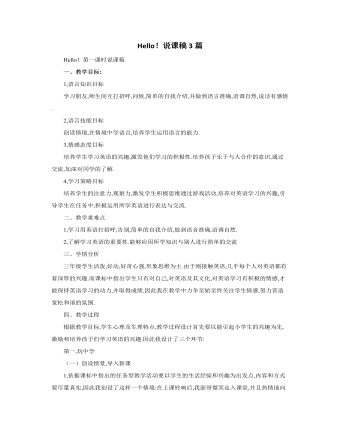
人教版新课标PEP小学英语三年级上册Hello!说课稿3篇
新授环节,教师引导语,“今天我们要与文具交朋友,看看他们是什么呢?看谁认识的朋友又快又准又多。”说完之后利用自制实物有声教具呈现文具的发音,方法是用识别笔点钢笔上的识别码,让钢笔自己说出:“Hello. I’m a pen. pen, pen, pen”学生对实物会说话非常好奇,极大地吸引孩子们的注意力,从而细心倾听它叫什么,从而记住文具英语的读音,大大调动学习的积极性及学习兴趣。对于四个单词的教学采用同样的方法。突破难点上采用分音节的方法教,如eraser, rayon的发音,使学生听到清晰的发音,然后再整体读,帮助学生更好的记住单词的读音。我们在课堂上创设一个有声有色的教学情景,再现一个现实生活的真实氛围,制作很多会说话的教具,这样就会吸引学生的注意力,激发他们对英语的兴趣。有了智能语音教具系统,这一切就很容易做到。
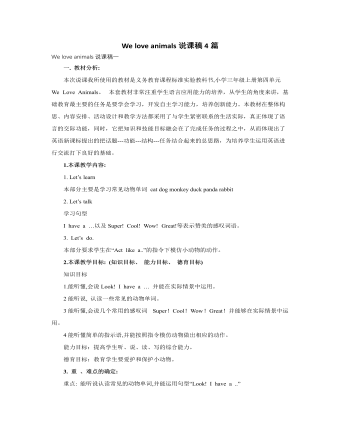
人教版新课标PEP小学英语三年级上册We love animals说课稿4篇
能力目标:培养学生听,做,说,读,写的能力,增进身体各部分的协调能力,语言表达能力。情感目标:让学生通过运用语言来完成学习任务,感受成功,从而引发和培养学生学习英语的内在动机,最终使他们形成英语学习的积极态度。同时培养学生要爱护动物。2. 教学重难点本课的教学重点是让学生能听、说、认读六个有关动物的词汇。教学难点是学生能将这六个有关动物的词汇运用到简单的英语句子中表达,突破重点和难点的关键是结合低年级学生喜欢游戏的特点,通过玩游戏,使单调的知识溶进生动的活动之中,让学生在听,做,动的过程中,掌握知识,并灵活地运用。三.说教法1.教法设计为了顺利完成以上教学目标,更好地突出重点,突破难点,按照学生的认识规律,我采用了讲读、直观演示、愉快教学相结合的方法,层层递进,激发学生的学习兴趣,充分调动他们学习的积极性,保持他们强烈的好奇心和旺盛的求知欲,进而促使他们由兴趣发展到产生要学好它的志趣。
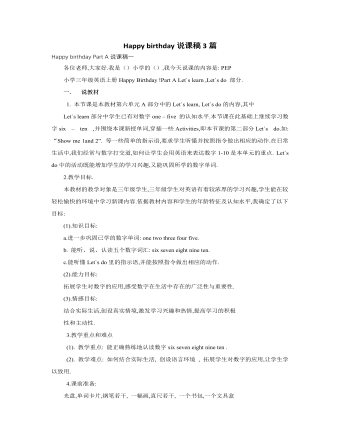
人教版新课标PEP小学英语三年级上册Happy birthday说课稿3篇
四、本课教学目标: ㈠ 语言知识目标: 1.Words: 能正确说birthday。 2.Drills: 能用以下句型进行交流Happy birthday to you. -Thank you.复习句型:How old are you ? (练习有关年龄的问答)。 ㈡ 语言技能目标:根据图片和情境说单词和句子。在一定场景下进行简单的英语交流和表演。㈢ 情感态度目标:通过本课学习使学生有兴趣听、说英语、做游戏、敢于开口,乐于模仿,在鼓励性评价中树立信心,在小组合作学习中感受学英语的乐趣,在给好朋友、亲人过生日的过程中感受友情、亲情的温暖。 五、重点: 1.Learn the words. birthday 2.Using the sentences to ask and answer. 难点: 1. Words: birthday的 正确发音。 2.Using the sentences to ask and answer. 六、课前准备 1 教师准备数字1—10的单词图片课件。。 2教师准备过生日用的蜡烛、气球、生日蛋糕图片等。 3学生准备过生日用的蜡烛、气球、生日蛋糕盒、生日帽等 4学生准备骰子。
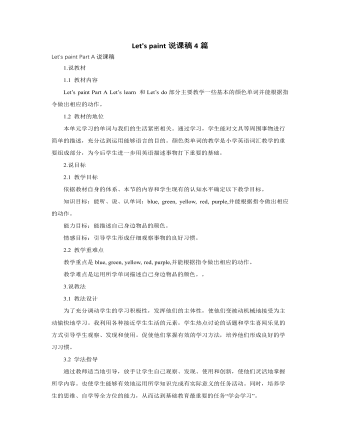
人教版新课标PEP小学英语三年级上册Let's paint说课稿4篇
本课教学从激发学生的兴趣入手,引导学生由词到句,循序渐进地达到学习目标,整个教学体现全员参与,体现合作探究,体现生活实践,在活动中开始,在情景中操练,在运用中创新,充分发挥学生的自主性,创造性。在整堂英语课堂教学中最大限度地激发学生的学习兴趣,使小学生在一节课的时间里始终保持高昂的学习状态。产生事半功倍的效果。 三、说教学手段 小学生的形象思维在其认识过程中占主导地位,三年级学生刚刚接触英语,学习一般靠直觉和体验,不善于把握语言规律,以直观的形象思维为主,对语言记忆以机械记忆占大多数,这就要求教师采用多样的教学手段,使课堂教学生动活泼,吸引学生,寓教于乐。1. 在小学英语课堂教学中要尽量多的采用实物情景进行直观的教学,这样做既符合小学生的认知规律,又能吸引他们的有意注意。
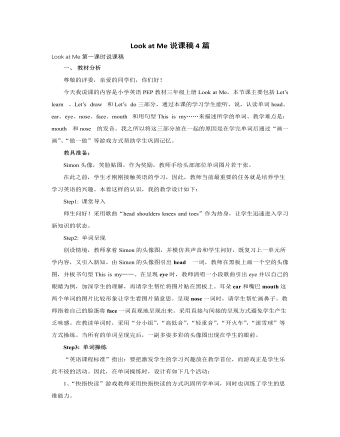
人教版新课标PEP小学英语三年级上册Look at Me说课稿4篇
5. 文化目标:本单元的文化知识是西方的万圣节(10月31日),万圣节是西方孩子们最喜欢的节日之一。他们身穿不同的戏装,戴上千奇百怪的面具,在街区走来走去。不少孩子手中还提着一盏“杰克灯”(Jack-o’-lantern)/南瓜灯,这种灯的做法是先把南瓜挖空,在南瓜上挖出眼睛、嘴和鼻子,贴上蓝色纸,制成南瓜灯,当中点上一支小蜡烛,放出幽灵似的蓝白光。孩子们常常从一家走到另一家,在人家门前高喊:“你想挨捉弄,还是款待我们?”(Trick or treat!)如果主人不给糖果或零钱,这些孩子就会捉弄他(她)。他们有时在门把手上涂上肥皂,有时把人家的猫涂上颜色。这些恶作剧常令大人啼笑皆非。当然,大多数人家都非常乐意款待这些天真的小客人。在晚上,人们常举行晚会,孩子和大人都身穿不同服装。万圣节人们常常做一些传统的游戏和活动,像:试图摘悬挂的苹果,算命,听有关鬼的故事。学校也经常举行晚会或化装游行。
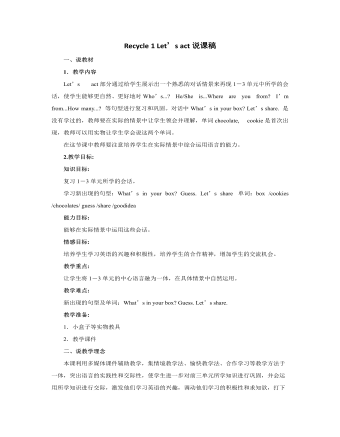
人教版新课标PEP小学英语三年级上册Recycle 1 Let’s act说课稿
小学生学习的主动性,大多取决于兴趣,他们充满好奇,对显而易见的实物和直观信息敏感性强、接受快。借助多媒体计算机CAI辅助教学,把所学内容更加直观地表现出来。4.游戏式复习热身,体现课堂教学开放性利用做游戏的形式进行旧知识的复习,既消除了上课初老师和学生之间的陌生感,又激发了学生学习兴趣,同时又对前面所学内容进行了巩固。5.综合运用“愉快教学”、“情境教学”、“合作学习”等多种教学方法,降低学习难度,活跃课堂气氛。6.展开活动式教学,设计各种形式为教学服务的活动,让学生在学中乐,在乐中学,不断强化知识的巩固记忆。7.设置评比台,及时评价小组及个人表现,鼓励学生积极参与学习活动。四、说教学流程1.拍手游戏热身2.师生问好,交流,对第一页内容复习3.引入第二页内容,学习新单词、句型4.趣味操练
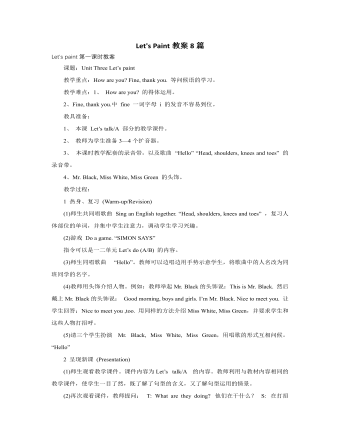
人教版新课标PEP小学英语三年级上册Let's Paint教案8篇
教学设计理念:英语课程标准明确指出,学生的发展是英语课程的出发点和归宿。小学英语课的主要目标是培养学生用英语做事情的能力,同时重视学科内容的有效融合。新课程提倡任务型教学,让学生在教师的指导下通过感知、体验、实践、参与和合作等方式完成教学目标。本着这一理念,我在设计本课时从激发和保持学生的学习兴趣入手,精心创设生活化语言情景,开展丰富多彩的活动,让学生在我的指导下进行语言交流,感受用英语交流的乐趣和成功感,从而培养学生用英语进行交流的能力。教学目标:1. 情感目标:关注学生的内在需要,在活动中培养学生的协作精神和竞争意识,培养学生学习英语的积极情感态度。2. 知识目标:能运用所学语言进行交流。3. 能力目标:通过本课的学习,学生能在实际生活中用英语进行问候;培养学生在课堂上进行自主评价的能力;培养学生根据情景猜测语义和在尝试中自我修正的学习策略。
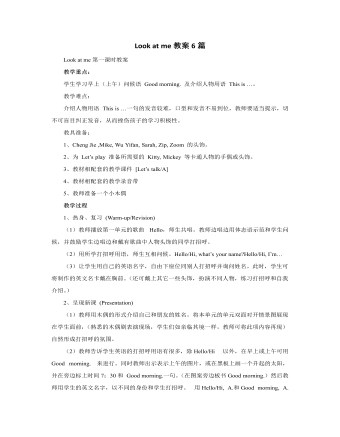
人教版新课标PEP小学英语三年级上册Look at me教案6篇
1.小组学习法全班分成各个部位,以半弧形状摆设,不仅拉近了师生、同学间的距离,便于口语交际和合作学习,而且让学生在独立与合作的交织中变得大胆、自信。2)Learning by singing, chanting, playing, touching.通过这些活动激发学生学习英语的兴趣,帮助他们建立学习的成就感和自信心。四.教学步骤英语课程的学习即是学生通过英语学习和实践活动逐步掌握语言知识,技能,提高实际运用能力的过程,又是他们陶冶情操,拓宽视野形成有效学习策略的过程。整个教学我设计了复习——新知展示——练习——小结及作业布置四个步骤。一.Warm-up1.Geetings2.SingasongT:Do you like to sing a song?Ss: Yes.T: Now, Let’s sing as ong,OK?Ss:OK. 【教师和学生一起边拍手边唱这首歌,不仅复习前面的打招呼语,而且把学生拉回到英语课堂,活跃了课堂的氛围,增加学生的学习兴趣】3.guessinggameT: Good. Look at me, What’s in my hand ?【教师拿出一个书包,书包内装入了各种学过的文具和一个玩具人头,让学生感到新奇,从而增强兴趣】
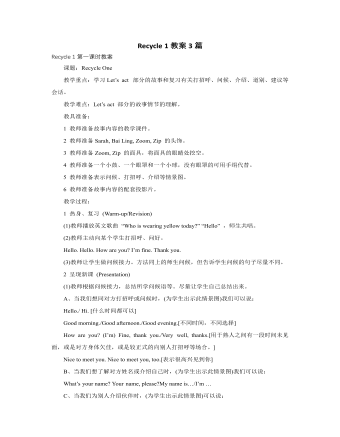
人教版新课标PEP小学英语三年级上册Recycle 1教案3篇
4 课堂评价 (Assessment) (1)做活动手册本单元第3、4、5 部分的练习。练习3是检测学生的词汇掌握情况。教师可以让学生组成两人组进行看词快说的比赛,说对一个词涂一朵小花,比谁的花多。练习4是让学生看词涂色,说说两种颜色的结合会变成什么颜色,并将第3种颜色涂在圈中。教师可以给学生做一个示范,然后再让学生动手实践。此练习是机动性练习,教师可根据时间分配情况灵活安排。练习5 是让学生将句子和相对应的图连线,教师可以先让学生看图,猜图上人说的话,然后再连线。此练习是检测学生对句子的整体认读能力,不需要学生认识句子中的每个单词。练习后,根据学生情况进行简单小结。给学生适当的奖励。(2)让学生自我评价半学期的英语学习情况,可在第37页上做标记,看看自己能达到什么程度。对于评价结果不太理想的学生,教师要及时鼓励,教育学生不能灰心放弃,针对这部分学生具体的情况在课后进行进一步交流。